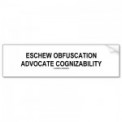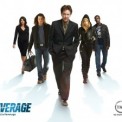What’s that smell?
I came across this quote by former British Prime Minister Harold Wilson: “He who rejects change is the architect of decay.” I screeched to a halt in my reading because it called up too many recent conversations I have had. (To be clear, I have had these same conversations not just of late, but multiple times over the past 30 years). I’d like to take that quote, change the start to “S/he” and send it to every nonprofit organization, staff member and board who stick Read more
Dust Off Your Ethics
It appears that ethical behavior is fast becoming an endangered species. And although I am not pointing the finger just at nonprofits, as a lack of ethical behavior does not favor one economic sector over another, it is where I work and where I come up against it way too often.
I certainly don’t want to present myself as the final authority of what it means to be ethical, but we’re really talking about basic common sense. The minimum standard of ethical behavior is compliance with Read more
Check Your Moral Compass
So, what are the challenges of being a leader in the first part of this century? I am sure that every article, presentation, talk, etc. written/presented in the first quarter of a new century that addresses “what it takes to be a leader” (and, no, I did not do a search) at some point says “these times are different: we have a different environment, different values, different needs, etc.” And I am saying the same thing: these are not your grandmothers’ times anymore—or for most Read more
Ethics Schmethics
The Penn State iconoclasm debate lingers on.
Minutes after being asked by yet another reporter about the purpose of removing names/statutes/plaques etc. of disgraced members of an organization (such as removing the name of Gary Schultz from the Penn State day care center that bore his name:*see answer below), I had a student in my MBA class make a statement to the effect that ethics are fungible: my ethics may not be yours, may not be hers, may not be his, and so forth. Already behind Read more
Who put the Moron in Oxymoron?
My sister’s second career is as a fifth grade teacher in a Washington, DC public school. She is just starting the unit on the Civil War, and this year, as she has done for the last four, she introduces the unit by talking about oxymorons. Each year, some of her students know what an oxymoron is; some don’t. She gives the usual examples, jumbo shrimp, good grief, sweet tart. This year, she found a new example that we both found quite amusing:
This time next year, Read more
 February 3rd, 2012 0 Comment
February 3rd, 2012 0 Comment We Can Do Better
Here’s a new year’s resolution that doesn’t show up on the routine list of working out more, spending less , being a better person. But it should be one of the ones that you don’t break—ever.
Everyone must adopt a code of ethics and live by it, no ifs, ands or buts. I’m almost embarrassed to be writing this, to be suggesting that people in the nonprofit sector don’t routinely operate from an ethical base. After all, we are supposed to be the “good guys,” the Read more
 January 6th, 2012 0 Comment
January 6th, 2012 0 Comment Money Talks, Ethics Walk
I do NOT believe for a moment that breeches of ethics and displays of questionable to unsavory to downright illegal behavior are more plentiful in the nonprofit sector than the for-profit sector. But they do evoke a very different response for me. Sad to say, whenever I read of an ethics violation in the corporate world—of which there have been far too many examples in the last 10 years—I now just shrug my shoulders, and admit to saying, “That’s to be expected,” and then move Read more
